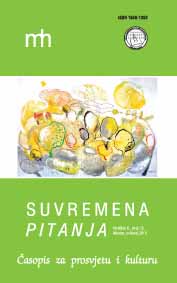Unutarnja reforma škole
Internal School Reform
Author(s): Marko NedićSubject(s): Education
Published by: Matica hrvatska Mostar
Keywords: internal school reform; organizational processes; educational technology; organizational structure of school
Summary/Abstract: The basic changes in school should guarantee an improvement of students’ achievements through the changes of organizational processes, contents and teaching procedures, structure and culture. Therefore it is necessary to develop the guiding/collaborating management and to ensure the transition from the reaching/learning model to the concept based on Gardner’s multiple intelligence. The new NPP should be consistent and coherent with the learning results defined in advance. During teaching it is necessary to make possible the realization of results at several levels (to learn: to know, to do, to live, to be, to evaluate and to believe). When forming the teaching strategies it is necessary to start from the assertion that everybody has an intelligence that functions in various ways (new learning paradigm). Besides, it is necessary, through versatile approaches, to ensure meaningful and contextualized learning. In this respect collaborating learning may be considered as an important alternative of the competitive model of teaching, this under the condition of a critical reexamination of the time schedule, spatial organization, roles and relations in school, and the adoption of a new structure of school, which is changed directly in contrast to the culture, which can be acted upon only indirectly.
Journal: Suvremena pitanja
- Issue Year: 2015
- Issue No: 19
- Page Range: 122-135
- Page Count: 14
- Language: Croatian

